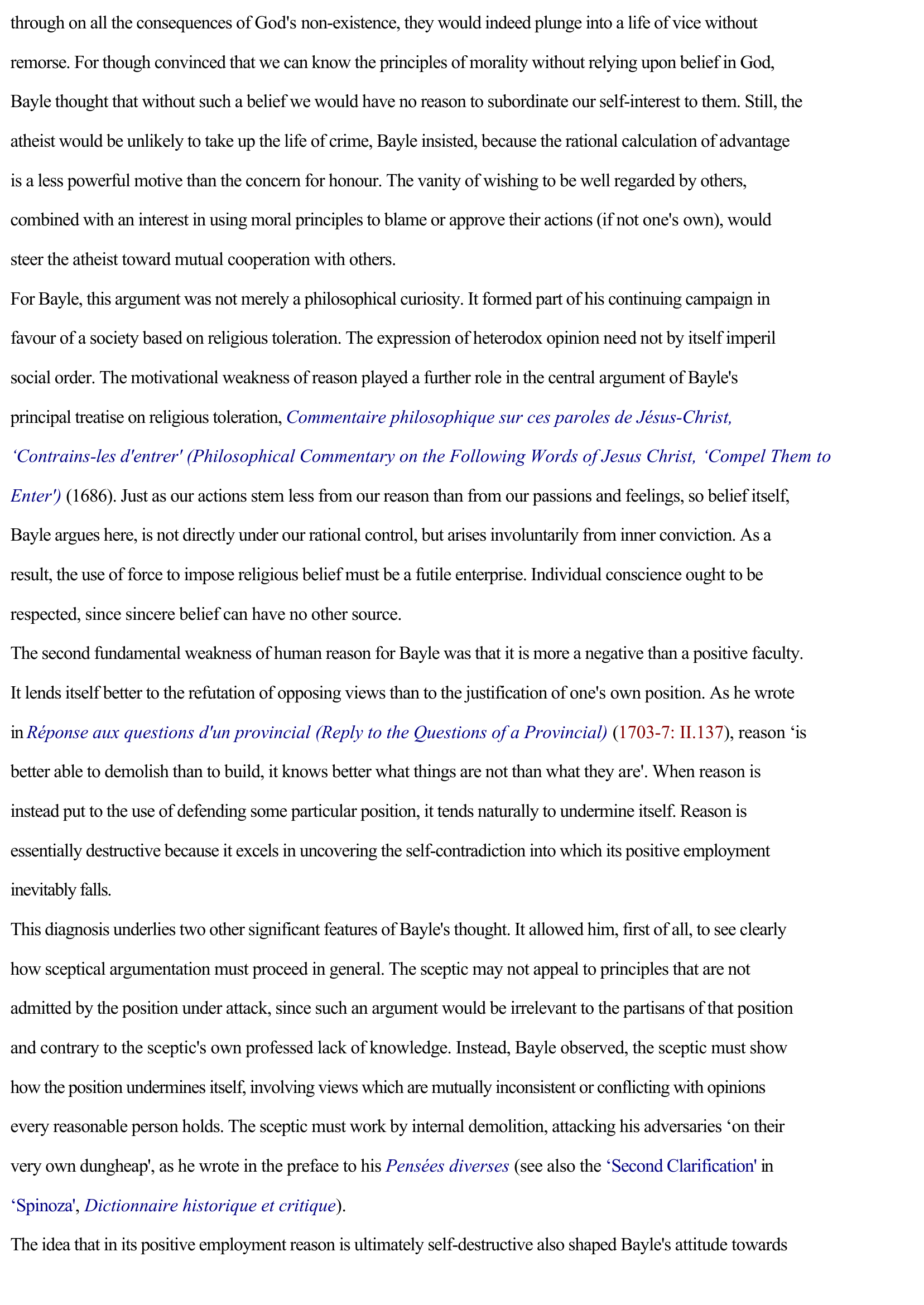Bayle, Pierre
Publié le 22/02/2012

Extrait du document
«
through on all the consequences of God's non-existence, they would indeed plunge into a life of vice without
remorse.
For though convinced that we can know the principles of morality without relying upon belief in God,
Bayle thought that without such a belief we would have no reason to subordinate our self-interest to them.
Still, the
atheist would be unlikely to take up the life of crime, Bayle insisted, because the rational calculation of advantage
is a less powerful motive than the concern for honour.
The vanity of wishing to be well regarded by others,
combined with an interest in using moral principles to blame or approve their actions (if not one's own), would
steer the atheist toward mutual cooperation with others.
For Bayle, this argument was not merely a philosophical curiosity.
It formed part of his continuing campaign in
favour of a society based on religious toleration.
The expression of heterodox opinion need not by itself imperil
social order.
The motivational weakness of reason played a further role in the central argument of Bayle's
principal treatise on religious toleration, Commentaire philosophique sur ces paroles de Jésus -Christ,
‘Contrains -les d'entrer' (Philosophical Commentary on the Following Words of Jesus Christ, ‘Compel Them to
Enter' ) (1686).
Just as our actions stem less from our reason than from our passions and feelings, so belief itself,
Bayle argues here, is not directly under our rational control, but arises involuntarily from inner conviction.
As a
result, the use of force to impose religious belief must be a futile enterprise.
Individual conscience ought to be
respected, since sincere belief can have no other source.
The second fundamental weakness of human reason for Bayle was that it is more a negative than a positive faculty.
It lends itself better to the refutation of opposing views than to the justification of one's own position.
As he wrote
in Réponse aux questions d'un provincial (Reply to the Questions of a Provincial) (1703-7: II.137 ), reason ‘is
better able to demolish than to build, it knows better what things are not than what they are' .
When reason is
instead put to the use of defending some particular position, it tends naturally to undermine itself.
Reason is
essentially destructive because it excels in uncovering the self-contradiction into which its positive employment
inevitably falls.
This diagnosis underlies two other significant features of Bayle's thought.
It allowed him, first of all, to see clearly
how sceptical argumentation must proceed in general.
The sceptic may not appeal to principles that are not
admitted by the position under attack, since such an argument would be irrelevant to the partisans of that position
and contrary to the sceptic's own professed lack of knowledge.
Instead, Bayle observed, the sceptic must show
how the position undermines itself, involving views which are mutually inconsistent or conflicting with opinions
every reasonable person holds.
The sceptic must work by internal demolition, attacking his adversaries ‘on their
very own dungheap' , as he wrote in the preface to his Pensées diverses (see also the ‘Second Clarification' in
‘Spinoza' , Dictionnaire historique et critique ).
The idea that in its positive employment reason is ultimately self-destructive also shaped Bayle's attitude towards.
»
↓↓↓ APERÇU DU DOCUMENT ↓↓↓
Liens utiles
- PENSÉES SUR LA COMÈTE de Pierre Bayle
- Fiche de lecture : PENSÉES DIVERSES SUR LA COMÈTE Pierre Bayle
- Fiche de lecture : PENSÉES DIVERSES SUR LA COMÈTE Pierre Bayle
- DICTIONNAIRE HISTORIQUE ET CRITIQUE Pierre Bayle (résumé & analyse)
- DICTIONNAIRE HISTORIQUE ET CRITIQUE, Pierre Bayle- résumé de l'œuvre

































